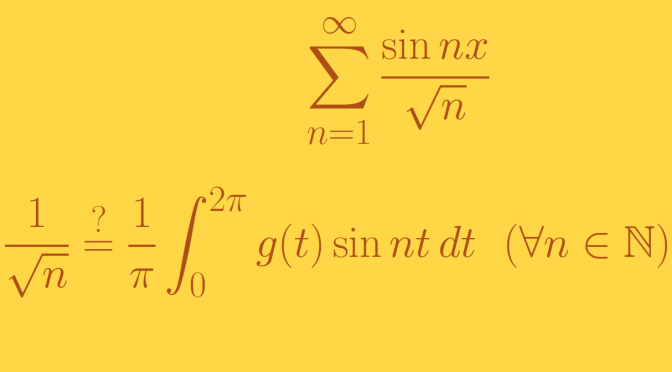We’re looking here at convergent trigonometric series like \[f(x) = a_0 + \sum_{k=1}^\infty (a_n \cos nx + b_n \sin nx)\] which are convergent but are not Fourier series. Which means that the terms \(a_n\) and \(b_n\) cannot be written\[
\begin{array}{ll}
a_n = \frac{1}{\pi} \int_0^{2 \pi} g(t) \cos nt \, dt & (n= 0, 1, \dots) \\
b_n = \frac{1}{\pi} \int_0^{2 \pi} g(t) \sin nt \, dt & (n= 1, 2, \dots)
\end{array}\] where \(g\) is any integrable function.
This raises the question of the type of integral used. We cover here an example based on Riemann integral. I’ll cover a Lebesgue integral example later on.
We prove here that the function \[
f(x)= \sum_{n=1}^\infty \frac{\sin nx}{\sqrt{n}}\] is a convergent trigonometric series but is not a Fourier series.
\(f\) is a convergent trigonometric series on \([0,2 \pi]\)
\(f\) is periodic with periodicity \(2 \pi\). \(f\) is also odd as the sine function is. Hence we can study the function \(f\) on \([0, \pi]\) only. The series is convergent at \(0\) as all the terms of the series defining \(f\) are vanishing at \(0\).
The sum \[\widetilde{D}_n(x) = \sum_{k=1}^n \sin kx\] is the imaginary part of \[1+z+ z^2+ \dots +z^n=\frac{1-z^{n+1}}{1-z}\] where \(z=e^{ix}\). Hence for \(0< \epsilon <\pi\) we have \[\widetilde{D}_n(x) = \sum_{k=1}^n \sin kx = \frac{\cos \frac{x}{2} - \cos (n+\frac{1}{2})x}{2 \sin \frac{x}{2}}\] for all \(x \in [\epsilon,\pi]\). Therefore \(\widetilde{D}_n(x)\) is uniformly bounded by \(\frac{1}{\sin \frac{\epsilon}{2}}\) on the interval \([\epsilon,\pi]\). Applying an Abel transformation we get \[
\left\vert \sum_{k=n}^\infty \frac{\sin kx}{\sqrt{n}} \right\vert \le \frac{2}{\sqrt{n} \sin \frac{\epsilon}{2}}\] for all \(x \in [\epsilon,\pi]\). This implies that the trigonometric series \(\sum_{n=1}^\infty \frac{\sin nx}{\sqrt{n}}\) is uniformly convergent on all closed intervals \([\epsilon,\pi]\) where \(0< \epsilon <\pi\). In particular, \(f\) is defined everywhere and continuous on \((0,\pi]\).
\(f\) is not a Fourier series
If the function \(f\) was the Fourier series of any Riemann-integrable function \(g\), \(g^2\) would also be Riemann-integrable. By Bessel’s inequality, we would have \[\sum_{n=1}^\infty \left(\frac{1}{\sqrt{n}} \right)^2 = \sum_{n=1}^\infty \frac{1}{n} \le \frac{1}{\pi} \int_0^{2 \pi} g^2(t) \, dt\] Which cannot be as the harmonic series \(\sum \frac{1}{n}\) diverges.


One thought on “A trigonometric series that is not a Fourier series (Riemann-integration)”